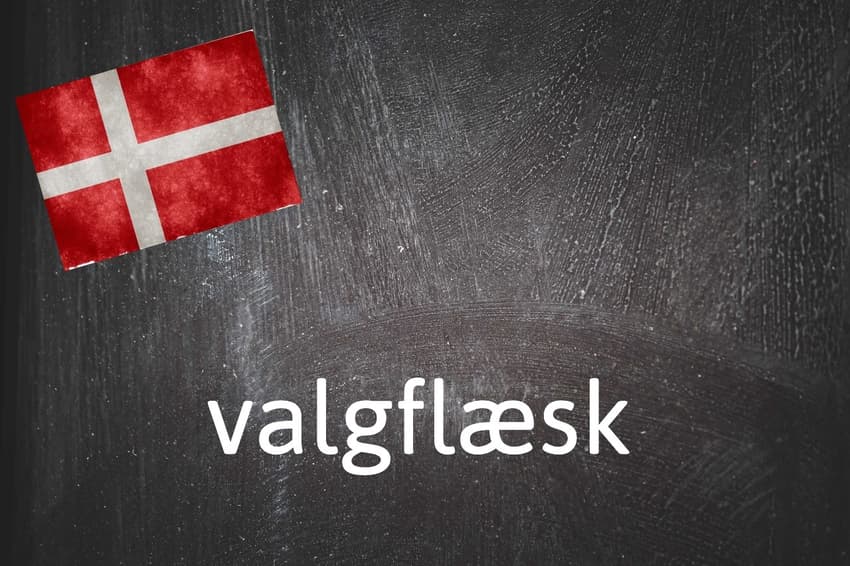Danish Word of the Day: Valgflæsk

Photo by Francesco Ungaro on Unsplash and Nicolas Raymond/FlickR
Today's word of the day will help you digest political talk at election and referendum time.
What is valgflæsk?
Literally, it means ‘election meat’: valg is "election" and flæsk "meat" or "roasted meat".
Although valgflæsk could possibly be used to describe a tasty roast dinner consumed on election night, its actual usage is mainly by politicians who are attempting to dismiss the policies of their opponents as empty campaign promises. Here is an example from Danish public service broadcaster DR's coverage of the general election back in 2019.
In short, valgflæsk is a claim or promise made by a politician in relation to an election which is criticised for its perceived lack of realism or sincerity.
Why do I need to know valgflæsk?
Although it’s worth knowing how to use it yourself, it’s even more useful to know what a politician means when they say valgflæsk.
The word arguably appears most often when parties are discussing rival policies and and manifestos, for example during general and local election campaigns.
However, the referendum on Denmark's EU defence opt-out, which will take place later this week, could also give rise to a mention or two.
The closest English expression to valgflæsk is probably "hot air", rendered in Danish as varm luft. But "hot air" can be used in a non-political context in both English and Danish, whereas valgflæsk is purely political. Nevertheless, don’t be surprised if you also hear varm luft used to criticise political foes: Hun siger, at hendes regering er vejen frem for miljøet – det er simpelthen en omgang varm luft ("She says her government is the best option for the environment – that is quite simply a load of hot air").
Examples
Ministerens udtalelser om skattelettelser ikke er andet end valgflæsk.
The minister’s assurances of tax breaks are nothing but empty promises for the election.
Oppositionen påstår at den er villig til at lytte til os, når det gælder ældreområdet, men jeg synes, det lugter lidt af valgflæsk.
The opposition claims it is willing to listen to our policies on senior citizens, but I think this is a clear sign of election bluffing.
Comments (1)
See Also
What is valgflæsk?
Literally, it means ‘election meat’: valg is "election" and flæsk "meat" or "roasted meat".
Although valgflæsk could possibly be used to describe a tasty roast dinner consumed on election night, its actual usage is mainly by politicians who are attempting to dismiss the policies of their opponents as empty campaign promises. Here is an example from Danish public service broadcaster DR's coverage of the general election back in 2019.
In short, valgflæsk is a claim or promise made by a politician in relation to an election which is criticised for its perceived lack of realism or sincerity.
Why do I need to know valgflæsk?
Although it’s worth knowing how to use it yourself, it’s even more useful to know what a politician means when they say valgflæsk.
The word arguably appears most often when parties are discussing rival policies and and manifestos, for example during general and local election campaigns.
However, the referendum on Denmark's EU defence opt-out, which will take place later this week, could also give rise to a mention or two.
The closest English expression to valgflæsk is probably "hot air", rendered in Danish as varm luft. But "hot air" can be used in a non-political context in both English and Danish, whereas valgflæsk is purely political. Nevertheless, don’t be surprised if you also hear varm luft used to criticise political foes: Hun siger, at hendes regering er vejen frem for miljøet – det er simpelthen en omgang varm luft ("She says her government is the best option for the environment – that is quite simply a load of hot air").
Examples
Ministerens udtalelser om skattelettelser ikke er andet end valgflæsk.
The minister’s assurances of tax breaks are nothing but empty promises for the election.
Oppositionen påstår at den er villig til at lytte til os, når det gælder ældreområdet, men jeg synes, det lugter lidt af valgflæsk.
The opposition claims it is willing to listen to our policies on senior citizens, but I think this is a clear sign of election bluffing.
Join the conversation in our comments section below. Share your own views and experience and if you have a question or suggestion for our journalists then email us at [email protected].
Please keep comments civil, constructive and on topic – and make sure to read our terms of use before getting involved.
Please log in here to leave a comment.